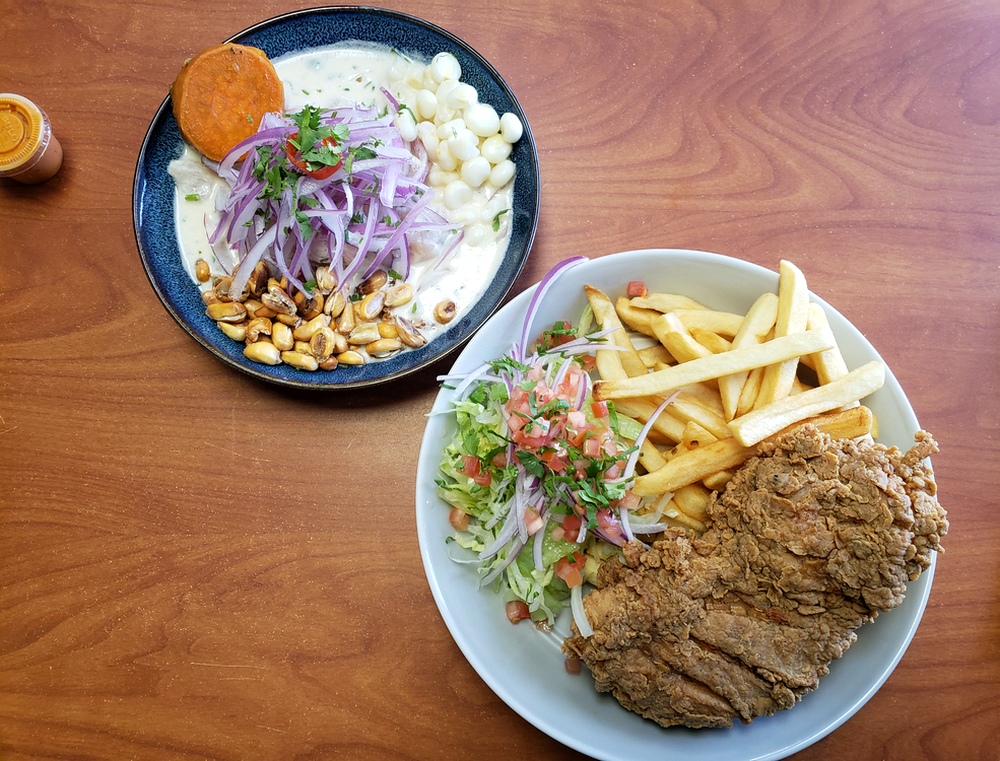Five years ago, husband-and-wife Carmen and Omar Zavala (she originally from Sylmar, he from Lima, Peru) took a chance and bought a restaurant, which had been owned by Carmen’s aunt for much of its existence. They moved down to L.A. from the Bay Area with their two kids and became taqueros.
Taquería Juanito’s has ruled its corner of a strip mall at Victory and Balboa Boulevards for the last 30 years. A snug L-shaped diner, its windows are hung with flags; trippy, taco-themed simulacrums of black light posters by the artist Amos Basilo, recalling the days when half of the Valley was head shops. Here a sombrero-ed dinosaur clutching a fat taco on a Mesozoic mesa; there a forest fairy hovering over a fat burrito between purple, spotted ‘shrooms.
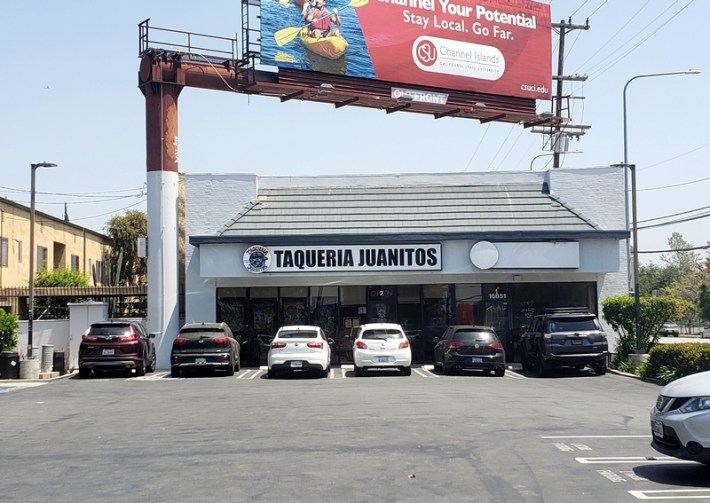
Without changing the signature recipes too much, they focused on improving them, making everything from scratch and dedicating themselves to only buying fresh organic tomatillos, garlic, and the other ingredients that go into their salsas and food.
But it wouldn’t be too long before the plancha, sizzling with the asada fries and quesabirrias beloved by lunch-breaking locals and after-school kids, was making room for lomo saltado and bistec a lo pobre, and the fridge case was stocked with as nearly as many cans of Inca Kola as there were cans of Coke.
You’ll find these items, and many more staples of Peruvian cuisine, on the menu dubbed Carmelitas Peruvian, which is served inside Juanito’s at all times, after launching in mid-January of this year.
“We always kind of had it in mind that we wanted to start a Peruvian food concept out of Juanitos,” Carmen tells L.A. TACO. “And we just never got to it, because we didn't really form our team. Towards the end of last year, we were like, ‘Okay, we're committed to hiring our team and getting the ball rolling.’ Finally, in January, we were just like, ‘All right, man, just launch whatever menu out there.’”
“I think that's what took us a while, because anyone can sell food, but it has to be good food, you know?,” she asks. “We really wanted to perfect the craft before we decided to launch Carmelitas.”
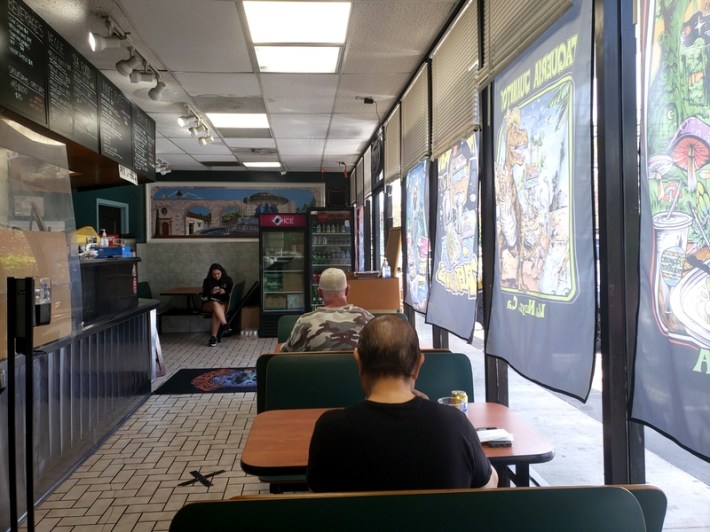
Omar is a self-trained chef who learned the ins and outs of being a taquero and cooking Mexican food after the couple took over Juanito’s. Carmen, who has a professional background in photography, loves cooking and has worked in the food industry for years. Currently, she’s the “prep-lady” for both concepts and also runs the register, while Omar cooks in a small kitchen with a smaller crew.
Carmelitas Peruvian offers 14 items, printed on a postcard-sized menu that leads off with papa a la huancaina and causa, includes ají de gallina, a super tender lomo saltado, and tacu tacu, with a backside concluding on three styles of tallarines (noodles), two ceviches, chaufa, and arroz con mariscos.
Under a soundtrack of Inspector’s Mexican ska and the anthemic Argentine pop of Gustavo Cerati and Babasonicos, and Chile’s Los Prisioneros, we made a filling lunch out of Carmelita’s fried pollo broaster and a ceviche de pescado.
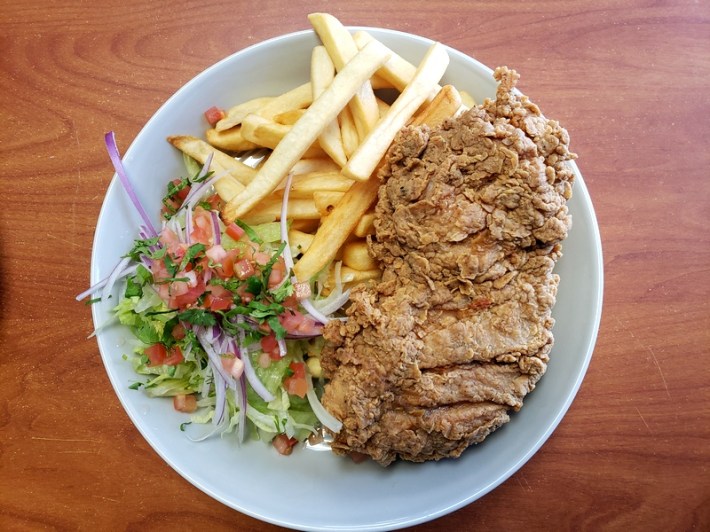
A large, pounded slab of crusty, fried broaster chicken draped over a thatch of thick fries and some vestigial salad appeared on our laminate wood table. And, to quote Genesis 1:31: It was good. It was very good.
Piping hot to the touch, the sizable, craggy crust crushed easily into juicy dark thigh meat, ringing with notes of cumin, black pepper, and fresh poultry. A balanced indulgence of sweet-and-spicy flavors served with a fiery-ass rocoto sauce on the side for the Valley’s more masochistic mouths. We tempered ours with a maracuya (passionfruit) agua fresca.
“[Pollo broaster] is actually a street food in Peru,” Omar tells us. “They come out at night with these little carts called ‘carritos sangucheros,’ where they fry chicken and fries and sell burgers. I wouldn't see no one selling it. And people like really like fried chicken, so it’s a perfect combination.”
Carmelitas makes about seven different sauces for its fried chicken and French fries, including its own mayo, mustard, rocoto, huancaina (from aji peppers), aceituna sauce (from fresh olives), and salsa golf (a sort of Argentine version of the sauce you’ll get on a Big Mac, to be mostly reductive about it).
“If there's a little thing that Peruvians love, it's homemade stuff,” Omar says. “We try to make everything by scratch. Peruvians hate pre-packaged mayo and little mayo packets, and industrial products. So I was like, ‘Let me take it to the basics and just make this little mayo, just a basic mayo.’ And they love it. They love the mayo.”
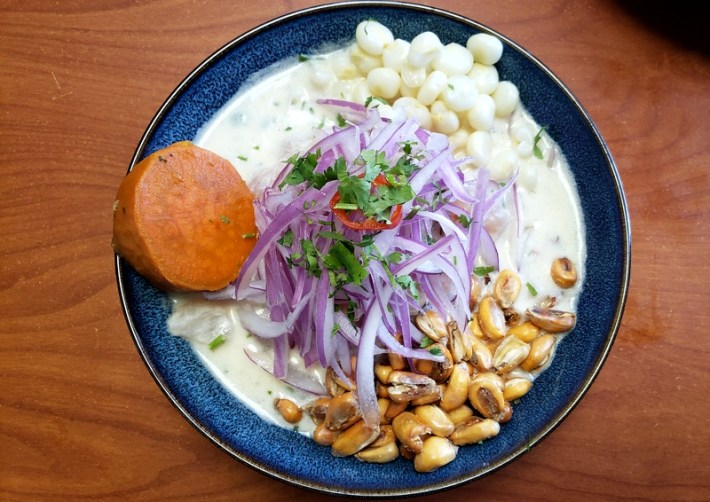
Carmelita’s ceviche is spread across the concave depression of a black-and-blue plate rimmed in gold. A mound of whitefish alternating between swai and cod sits amassed in the middle, mostly submerged below a broth of milky alabaster flecked with chopped herbs. A mound of thinly sliced onions and cilantro is crowned by a single coin of sliced red chile rocoto.
From opposing sides of the plate, dried and fresh choclo (corn) do dagger eyes at each other, a big orange sweet potato plopped across the ring from them, staring them down like the Mills Lane of nightshades.
“I love ceviche,” Carmen tells us. “Oh, my god. I practiced my head off with that ceviche. I made sure I perfected the taste. This is my plate. If anyone ever orders a ceviche, let me make it.”
The ceviche is indeed insanely delicious, light and cooling, but with heat that the kitchen can turn up or down depending on your wishes. The fish is silky and abundant, the two types of corn creating layered textures of crunch and down in every mouthful of its creamy liquid.
Somehow, even amid this standout Peruvian lunch, the sweet, crumbly, broth-saturated sweet potato was one of the best things we’ve put in our mouths in recent memory.
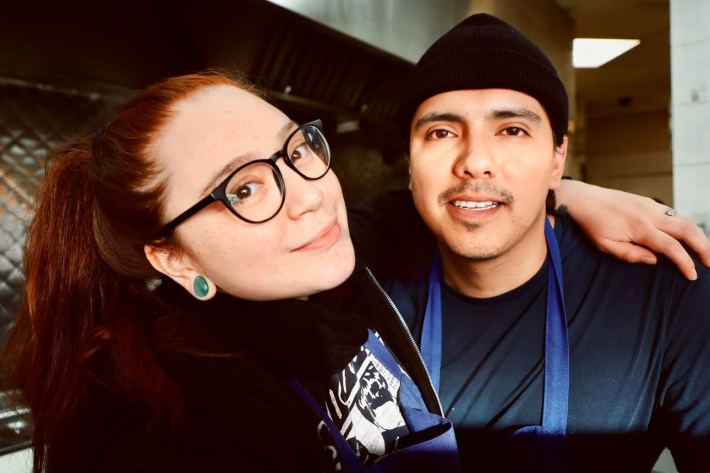
Omar and Carmen developed their Peruvian concept in a three-decade-old Mexican restaurant popular with working-class neighbors. The after-school set was born out of what they say is “a love for the culture.”
Just as Omar has learned to make the Mexican food Carmen grew up on, she loves Peruvian food and feels integrated into the culture, as well. She frequently cooks it at the couple’s home, listens to music, and watches shows and movies from Peru.
At Carmelitas-Juanitos, we saw most tables diving into big plates of lomo saltado, seco de res, and ají de gallina, instead of fajita plates or tacos.
“The Peruvian community here in the Valley is super tight,” says Carmen. “We've seen a ton of Peruvian people come in and try our food, and it's kind of intimidating because it's a Mexican restaurant. But we always tell them, ‘This is authentic. It's cooked by an actual Peruvian.’
Juanito’s loyal regulars also appreciate having these additional flavors to choose from.
“I'm very proud of bringing our food, Peruvian food, and the acceptance from our Mexican brothers,” Omar says. “We were amazed that so many people, so many Mexican people, know and have eaten Peruvian before. People by people, they are spreading the word. Slowly, but we're happy with the result. It's really humbling.”
“You'll see someone come in who usually gets a burrito, and they're like, ‘let me have a lomo saltado,’” notes Carmen.
The couple hopes the concept’s success will pave the way for a Carmelitas in its own dedicated space.
“We're enjoying having Carmelitas at the restaurant, but we realize that sooner or later it is going to probably need its own location, simply because the positive feedback has been so overwhelming,” says Carmen.
In the meantime, during those times when you (naturally, obviously, desperately) crave tacos but your (laaame) companions want anything but, you have this thrilling 2-in-1 option where you can have your tacos de lengua and they can have their salchipapa, all of you grazing spoons gingerly over a shared ceviche mixto.
Carmelitas Peruvian ~ 16851 Victory Blvd. Ste. 2 Van Nuys, CA 91406. Closest Metro lines and stop: Metro G Line - "Balboa Station" or Bus Lines 164, 235, and 236 - "Victory/Balboa."
